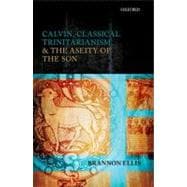
Note: Supplemental materials are not guaranteed with Rental or Used book purchases.
Purchase Benefits
What is included with this book?
| Introduction | |
| Calvin on the Aseity of the Son: The 1559 Institutes as Entry-Point | |
| The Autothean Controversies: Calvin s Complex Solidarity | |
| The Theological Shape of the Autothean Debates: Eternal Generation s Role in Classical Trinitarianism | |
| Identity, Distinction, or Tension in Trinitarian Language?: Loose Approaches to the Son s Aseity | |
| Tension In Distinction: Classical and Mainstream Reformed Approaches to the Son s Aseity | |
| The Irreducible Triunity of God: The Reformed Minority Report s Strict Distinction of the Two Ways of Speaking | |
| Of Himself, God Gives Himself | |
| Table of Contents provided by Publisher. All Rights Reserved. |
The New copy of this book will include any supplemental materials advertised. Please check the title of the book to determine if it should include any access cards, study guides, lab manuals, CDs, etc.
The Used, Rental and eBook copies of this book are not guaranteed to include any supplemental materials. Typically, only the book itself is included. This is true even if the title states it includes any access cards, study guides, lab manuals, CDs, etc.